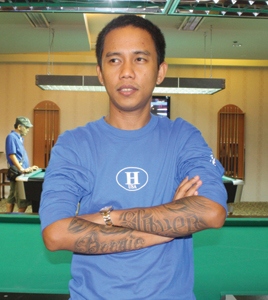|
|
Current Issue
Previous Page Page 2 Next Page
>
Next in Line
 |
| Corteza's recently added forearm tattoos are clues into his dual nature. (Photo by Ted Lerner) |
COMBING THROUGH his past for clues as to the hows and whys of Corteza's pool brilliance does not reveal the usual circumstances of deprivation and want common to most other Philippine pool greats. Corteza, the eldest of five boys, was born in 1979 on the outskirts of the large southern Philippine city of Davao into a fairly middle-class family. His father held a coveted civil service job as an engineer for the Bureau of Lands.
An early clue into the boy's future personality emerged somewhat prophetically when it came time to name the Corteza couple's first baby. His parents had been big fans of Lee Van Cleef, the crag-faced actor who starred, often as a cool and calculating villain, in some of the biggest westerns and action movies in the 1950s and ?60s. Cleef's rugged looks and swagger made him a dashing yet mysterious figure to his legions of fans. These traits could easily describe Lee Vann on and off the table today.
His dad naturally wanted his eldest son to follow in his footsteps and become an engineer with a safe government job. But, at 13 years old, Corteza headed in the completely opposite direction.
"I never played pool before, but my friend kept bugging me to go to the local poolhall," Corteza recalled. "The owner hated us because we didn't know how to play. My first time, I ripped the cloth on the table trying to do a draw shot. The owner said, 'OK, the two of you are banned.' That was OK. We just went to another poolhall."
Despite the inauspicious start to his lifelong journey, Corteza became absolutely hooked. Luckily for him, his newfound passion found little opposition from his conservative Catholic parents.
"I always [told] my mom we're going to a poolhall," Corteza said. "So long as I did my school assignments first, she [was] OK."
Part of Corteza's obvious pool lineage stems from the same thing that makes all the Filipino players so solid: Growing up, he only played 15-ball rotation. Up until the advent of 9-ball and now 10-ball, rotation has always been the game of choice in Philippine poolhalls. And it's not just the extra traffic on the table that has helped elevate players' games. It's the conditions they play in. Provincial poolhalls, such as those found where Corteza grew up in, are always open air, in searing tropical humidity, often with old, raggedy cloth and cockeyed pockets. Learning the game in these conditions turns strong players into supermen.
It wasn't long before Corteza began to play and win in small money games in his town. A year after first picking up a cue, he went to Davao City proper. "That's where all the best players were," he said. "I heard they had a tournament. So I entered in the C class, the lowest class. And I won the first tournament I entered."
Corteza's game caught the eye of Ben Carusos, at the time the head of the Davao Billiard Association. "Even at his young age, Lee Vann was very educated and passionate when it [came] to cue sports," said Carusos, who now lives and works in Japan. "He's self-made. He was always watching other players and copying them. He always had this confidence about him. Even if he plays money matches against a better player, he thinks he's the better player."
Carusos knew the Manila scene well - and knew that he and his newly discovered talent could earn some fast money in the big city, where nobody had ever seen Corteza play. (Carusos even kept a house in Manila solely to house provincial players whom nobody knew.)
"He said to me, 'I will bring you to Manila,'" Corteza said. "So I said OK. I told my mother there was a tournament in Manila. She said, 'How long will you be gone?' I said a week."
Convinced her 16-year-old son would soon return home, Corteza's mother relented. The youngster, accompanied by Carusos, journeyed by boat for a day and a half to Manila.
"He took me to some lower-level poolhalls," Corteza said. "These are dangerous places. Guys drinking and carrying knives." But they won plenty of easy money. The two also went to the university areas, where Corteza would dress like a student and clean out the real students of their pocket money.
That one-week trip turned into two years in Manila. During that time, Corteza ate, breathed and slept pool, practicing 10 hours a day, playing non-stop money games. Corteza became so immersed in the game and earning money that he never once contacted his parents back home - not even a phone call. Then, after two years, he went back to Davao. "I played all the best players in Davao and I beat them all," Corteza said.
Previous Page Page 2 Next Page
>
Top |
|





